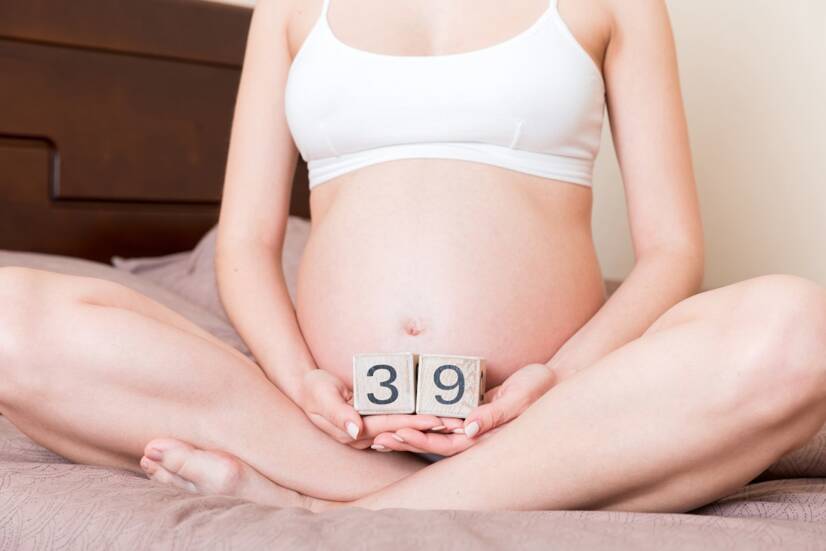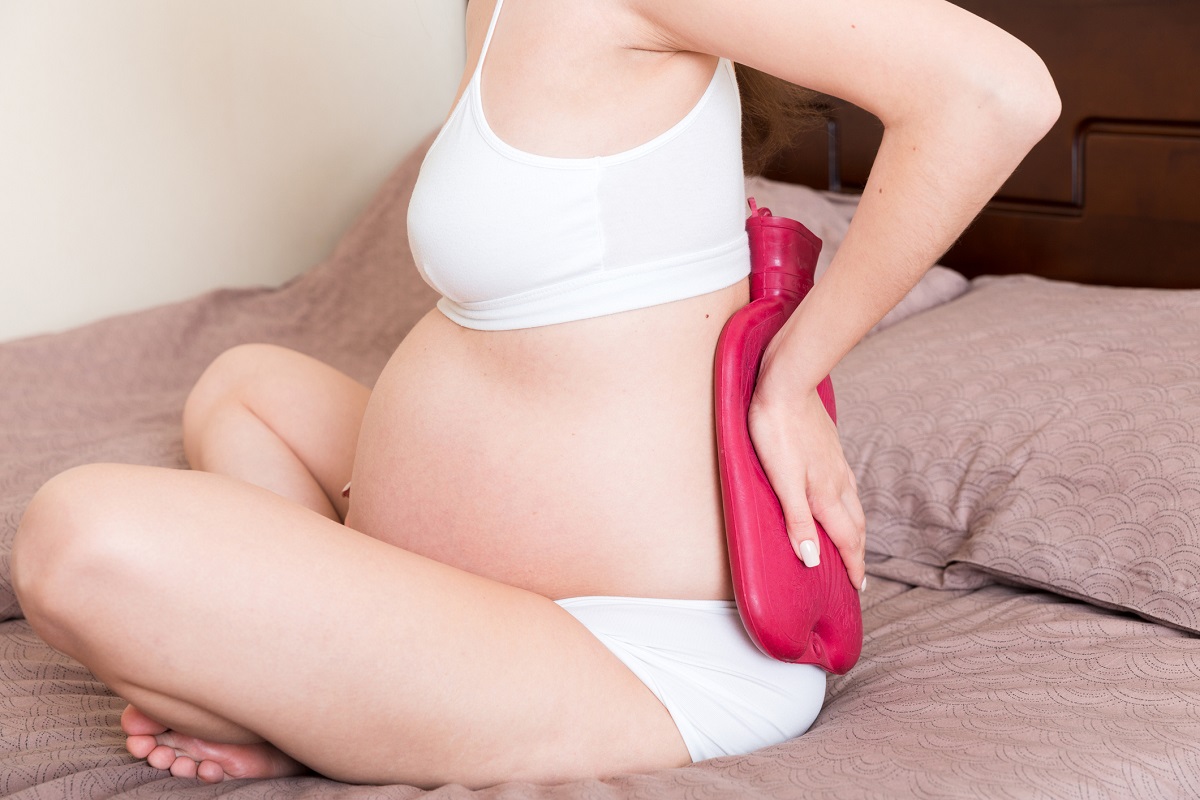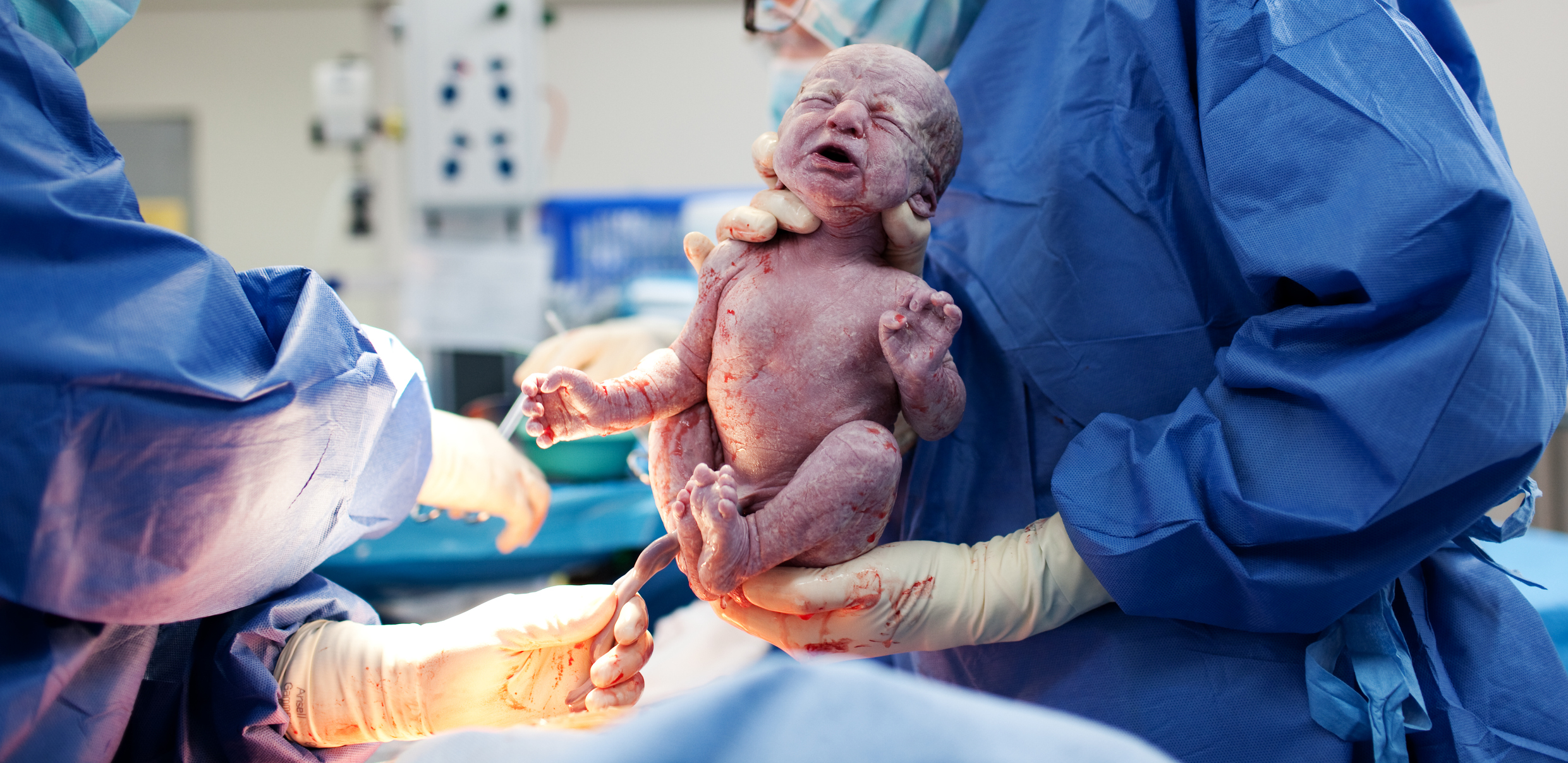- Introduction to Obstetric and Pediatric Nursing: Gloria Leifer
- healthline.com - What to expect at 39 weeks of pregnancy
- nhs.uk - A week-by-week guide to pregnancy
- whattoexpect.com - Pregnancy at 39 weeks gestation
39th week of pregnancy: do you often think about giving birth?

As the due date approaches, you're thinking more and more about how it's all going to go. You're getting impatient and curious about what it's going to be like, who your baby will look like and if everything will be okay.
Article content
At 39 weeks gestation, the baby is officially considered mature. Only one week remains until the expected due date.
How is your baby developing in your tummy?
The approximate weight of the fetus is 3290 g and the length is 50 cm.
Your baby is ready for birth. It is fully developed and carried.
It is now only gaining weight. In the last days of pregnancy, the fetus is gaining about 14 grams a day.
Your baby has 300 bones in its body, while an adult has 206 bones. Its bones are fused together after birth.
The baby has a prominent chest.
The baby's brain is 30% larger than it was 4 weeks ago. It continues to grow at a rapid rate that will continue for the first three years of life.
The development of the baby's brain is fascinating. After birth, you will be able to observe it with your own eyes. Every day it will surprise you with its abilities, dexterity and rapid development.
The skin is pink and covered with vernix, or sebum, which is white and resembles a cheese-like consistency. Its function is to protect the fetal skin from cracking, to moisten it, to protect it from infection, and to ease your baby's passage through the birth canal by its slipperiness.
Almost all of the lanugo is gone from the skin.
His fingernails already extend beyond his fingers.
There is already a fair amount of surfactant in your baby's lungs, yet it is increasing this week.
Your baby is very perceptive. He is aware of everything in your environment, such as voices, music, his mother's movements and her touch.
During this period, some of your hormones pass into the fetal body. Because of these hormones, the newborn has swollen genitals after birth.
In girls, the labia majora cover the labia minora and in boys the testicles descend.
The tear ducts are not yet open.
I'm sure you've heard that babies cry a lot, but they don't produce tears. The tear ducts gradually open after birth. It's not until about the first month of life that you see your baby's first tears running down his chubby cheeks.
The placenta continues to nourish your baby. It supplies him with antibodies that strengthen his immune system and protect him from infections until 6 months after birth. By breastfeeding, your baby acquires additional antibodies needed for his immune system.
The baby's head descends into the pelvis.
The table shows the approximate dimensions of the fetus at 39 weeks according to sonographic measurements
| Total length | Weight | HC Head circumference | BPD Transverse head diameter | AC Abdominal circumference | FL Femur length |
| 50.7 cm | 3290 g | 331.4 mm | 94.4 mm | 340,8 mm | 70,8 mm |
For more information on fetal size, see the article:
Ultrasound in pregnancy: fetal size, what is fetal biometry?
Before birth, the fetus releases high amounts of the hormone estrogen, which triggers contractions and initiates labor. This makes the transition from fetus to newborn.
How does a woman feel at 39 weeks?
You can't wait for the moment when you finally see your baby and hold him or her close to you.
You must be imagining how beautiful and chubby your baby will be. However, due to the birth, his appearance may change to oval, which will flatten out in a few days after delivery. He may have a swollen face or may even have a rash on it. Don't worry, in a few days your baby will be beautiful and everything will flatten out.
You will probably feel the movements less. This is because of the growing size of the baby and the lack of space in the uterus. Even if your baby's movements have decreased compared to the previous weeks, it should still be active.
Feeling the baby move in the uterus is the most beautiful moment of a woman's pregnancy. His shifts, kicking, shifting and stretching are the most beautiful memories of pregnancy. Heartburn, back pain and discomfort go away.
The feeling of a new life growing inside you, the development and anticipation of its arrival are the most joyous moments of a woman's pregnancy.
You feel huge and awkward.
You may feel like a big ball. Your movements are slow and labored. You try not to make sudden movements to avoid pain.
Your belly is dropping. The fetus is descending into your pelvis and you are able to breathe deeply. Your problems with feeling short of air have subsided.
Your uterus has reached its maximum size. Despite the baby's weight gain, it is no longer enlarging.
Stretch marks may continue to form on your abdomen. Your skin is drying out. Continue to cream and take care of it to prevent further stretch marks. Stretch marks will fade within a few days after birth. Some small ones will disappear and those that remain will become a sign of maternal pride.
Feeling anxious and scared before giving birth is perfectly normal. You don't need to be scared. You won't be alone in the hospital during labour. The medical staff and doctor will help you bring your longed-for baby into the world.
Fears are often worse than reality.
The Braxton-Hicks contractions are getting stronger and more frequent. They prepare your body for the big event that will be childbirth.
The baby's head is lodged in your pelvis. This can cause you to feel more severe pain in this area.
Pain shooting from the vaginal area to the legs can occur from the baby's pressure on the pelvic nerves. It's not dangerous, so don't worry. It's just uncomfortable.
Fatigue is your companion during pregnancy. Your body is exerting a lot of effort, so you get tired faster.
Sleep problems, insomnia, frequent night wakings will also manifest themselves in the form of fatigue during the day.
Frequent urination is becoming more frequent due to the baby's drop in the pelvis and pressure on the bladder.
Back pain is quite common. Your spine is more stressed by the growing tummy and its weight. There may also be pain in the side from the growing uterus and its pressure.
If you have a headache, try to drink and lie down for a while. Sometimes the pain also occurs from a lack of fluids in the body. If you follow a drinking regime, the pain will subside. If the sharp headache persists, go to the nearest hospital and have your blood pressure checked.
Bloating and constipation will continue to accompany you. Your internal organs, including your intestines, are oppressed by the uterus. By adjusting your diet properly, you can avoid constipation and the subsequent development of hemorrhoids from the pressure of stool.
Hemorrhoids can also arise due to the pressure of the uterus on your pelvis.
For more information about hemorrhoids in pregnancy, see our article:
Hemorrhoidsin pregnancy and after childbirth. Why do they form, how to treat them?
You may also experience hot flashes due to pregnancy hormones.
If you feel dizzy, lie down and stretch your legs to promote blood flow to the brain. In the last month, it is best to lie on your left side. Blood flow through the inferior vena cava will be relaxed and the dizziness will usually subside.
In the last weeks of pregnancy, swelling of the legs or arms often occurs.
Darkening of the skin on the face or brown pregnancy spots are formed due to hormones. After childbirth, they usually disappear completely.
Your skin is more oily, your hair is shinier and has more density. This is all due to pregnancy hormones.
The colostrum drains from your breasts in drops. Your breasts are ready for breastfeeding and form the first nourishing milk for the baby.
Increased attention should be paid to urinary tract infections, which are especially common in the last trimester of pregnancy. They manifest themselves with bladder pain and burning during and after urination. If you have these symptoms, see your doctor. The doctor will perform a urine test and arrange appropriate treatment.
Vaginal infections are also common in the last trimester. They are manifested by discomfort in the genital area, itching, burning and a change in the colour and consistency of the discharge. The infection must be treated with appropriate treatment recommended by your gynaecologist.
Vaginal discharge should be clear or slightly yellowish in colour. In late pregnancy, it is often coloured pink from the bursting blood vessels of the cervix, which is dilating and preparing for delivery.
You may notice the sudden departure of the mucus plug in the form of a small amount of thick mucus, sometimes with an admixture of blood. The departure of the mucus plug in the third trimester usually occurs 24 hours before the onset of labour.
You may also experience a false alarm in this week, during which you will feel contractions. However, the contractions will only be of mild intensity and will not be regular.
Many women experience nausea before the onset of labour contractions. You may feel a surge of energy or experience the passing of a mucus plug before labour. The passing of the mucus plug is followed by a pink discharge from the bursting of the delicate blood vessels of the cervix, which shortens and opens.
Before approaching childbirth, some women experience back pain or pain in the form of menstrual cramps and marked fatigue.
Of course, it is not a rule that every woman will experience these symptoms just before giving birth.

Symptoms of labour starting
- Outflow of amniotic fluid. After the amniotic fluid has drained, labor usually occurs within 12 hours.
- A bloody or brownish discharge is a sign that the cervix is preparing for delivery.
- Regular contractions, weak and irregular at first, then more intense and regular.
- Back pain. Many women experience significant back pain just before giving birth.
If you feel fluid slowly starting to drain from your vagina, your amniotic fluid is probably starting to drain. Slowly pack your things and go to the delivery room. You will probably go into labor within 12 to 24 hours.
Spontaneous labour can happen at any time. Spontaneous labour cannot be planned exactly. There's no telling how it will go.
Labour can start as soon as the amniotic fluid drains without any contractions. If your amniotic fluid drains, take your bag and go to the hospital. Do not delay or wait for the onset of contractions.
Labour can also start with the onset of contractions without the amniotic fluid draining. Watch the intervals of contractions. Put a sanitary pad in your trousers to be safe. The amniotic fluid is likely to burst and drain within a few hours.
Wait for the onset of contractions. If they come at regular intervals of 5-8 minutes, go to the hospital where you want to deliver the baby with your things packed.
You can never be sure exactly how your labour will start. That's why it's very important to watch for signs.
Try to avoid stress, be calm. Breathe calmly, as you were taught in your antenatal course.
Which you should by no means ignore:
- Vaginal bleeding
- Severe itching in the genital area
- Severe headache that does not subside
- Vision problems, blurred vision, sensitivity to light
- Pain just below the ribs
- Extreme swelling of legs, feet, nipples, hands or face
- Persistent stomach pain
- Elevated body temperature above 37.5 °C without flu or cold symptoms
No signs of labour yet?
No need to worry if you have no complications or ill health.
Your baby may decide to come into the world within a few hours or days, but it can also extend its arrival until the 42nd week.
It is possible that you wake up in the morning as usual, with no signs of labour. Suddenly, you are surprised by the outflow of amniotic fluid and by midday you are holding your baby in your arms.
If you're expecting twins and haven't given birth yet, you'll probably be sent to hospital. At the hospital, they'll decide how your labour will go and plan the day of delivery.
What kind of tests will you have at 39 weeks?
Once a week you will go to the consulting room where the doctor will examine you.
They will check your urine, take your blood pressure, listen to the fetal sounds, sonographically check your baby, check your amniotic fluid, do a CT scan and check your cervix.
Your doctor may also recommend that you visit the clinic every other day. However, you don't need to worry that anything is wrong. These are just preventive examinations to catch the birth early. This way, you will be sent to the hospital in time for delivery. Sometimes, frequent check-ups can also prevent a late delivery.
What if the baby is born now?
Your baby is already at term, fully developed, carried and ready for life outside the womb.
Boys are usually heavier than girls.
If a baby is born at term with a low birth weight, it is then referred to as a hypotrophic fetus, due to the baby's lack of nutrition in the womb.
This is due to insufficient function of the placenta or to illness of the mother, for example, in high blood pressure, in kidney disease. However, such a fetus can be detected during a sonographic examination already in the consulting room, and so its condition is dealt with while still in the abdomen.
The opposite is a hypertrophic fetus, which is too large for its gestational age. Often babies are born weighing up to 5 kilograms.
Very often they occur in mothers suffering from gestational diabetes.
When your baby is born
Babies don't usually cry right after birth, as they do in movies. It may take a few seconds for their airways to clear.
Immediately after birth, the baby will be examined, measured and evaluated by Apgar score. The evaluation takes place at three time intervals - after the first, fifth and tenth minute after birth.
The assessment is as follows:
- his heart rate
- breathing
- his muscle tone, movements and activity
- its response to stimuli
- skin colour
This assessment determines whether the child is healthy or needs treatment and help. The maximum number of assessment points is 10 in each case.
A newborn's hands and feet may be blue because the blood is still circulating. The skin may be dark red to purple. After the first breath, it turns a brighter red.
If you notice your baby rubbing more vigorously with a towel, don't be alarmed. Doctors do this to encourage your baby's blood flow.
Your baby's breathing may not be regular yet. It may take a few minutes for him to start breathing regularly.
Boys may be born with large testicles. This is only temporary, due to hormones and water retention in the body.

The first sight of the baby after birth may seem strange to you, but don't worry.
After giving birth, a woman is exhausted and feels great relief when the baby is born. That's when you see your baby. It's wet, sometimes with visible blood and ooze on its body.
At the first breath and even after it, babies sometimes make different grimaces, just like when they try to open their eyes in bright light. Until now, they have been in the womb all the time, where they have had darkness and only a soft light penetrating through your skin and the womb. After birth, the light is quite sharp for them.
For you, it is too much of a new experience in just a few minutes. When they bring your already washed and treated baby to you and put it to your breast, it will be the most magical moment of happiness and love for your baby.
After the birth, you will still look like you are pregnant. Your tummy will be large. It may take up to 6 weeks for it to return to its original size.
Breastfeeding is very beneficial not only for your baby but also for you to get your body back. Breastfeeding helps the uterus to shrink faster and return to its original size. You even burn calories by breastfeeding.
What we can recommend:
- Follow a healthy diet.
- Eat smaller portions and more often.
- Avoid spicy, spicy foods to prevent heartburn and nausea.
- Getting enough fluids is important for your body and your diet. If you don't get enough, you will feel tired, have little energy and may get a headache due to lack of fluids in your body.
- Move more slowly and do not make sudden movements to avoid unpleasant pain.
- Take care of your emotional health, which is important to you and your baby. He or she can sense your feelings too.
- Find time for pregnancy exercise and walks. This will give you the strength and energy you need for labour and for an early recovery.
- Practice the breathing exercises that were shown to you in your antenatal preparation.
- Take time for yourself, rest more and don't overwork.
- If you feel tired, take a nap during the day.
- Put your feet up on a pillow, avoid standing and sitting for long periods.
- Try aromatherapy, which has an effect on your well-being and can make your day smell good.
- Read books.
- Listen to music that you like. It also acts as therapy. Listening to music and relaxing can make you feel at ease and make you think different thoughts.
Always have your maternity bag ready to go, to avoid last minute stress.
Learn more about the next weeks of pregnancy in the summary article.
Gallery


Interesting resources
Related










